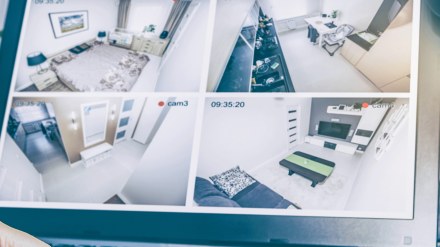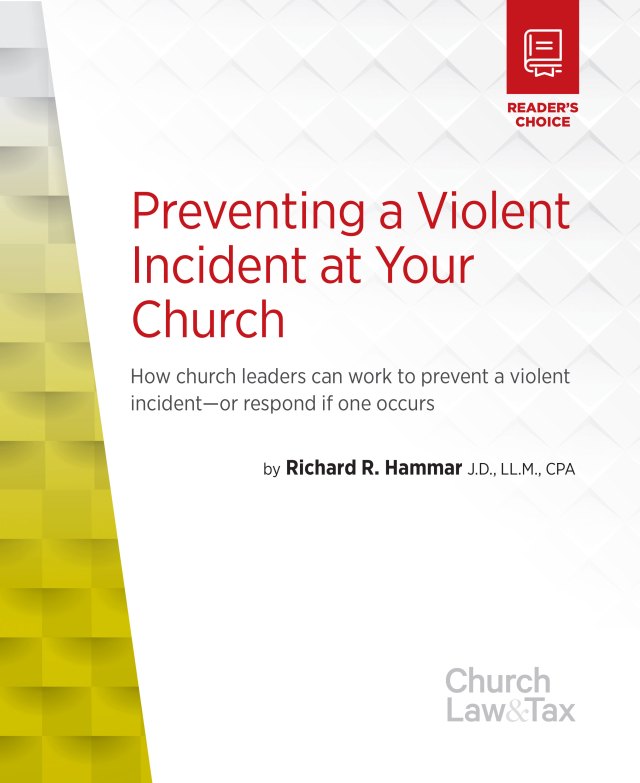A mother accused a Sunday school teacher of molesting her young daughter. But the crime never happened—video from a church security camera proved the accusation false.
A couple broke into a church intent on stealing the Sunday offering. But a camera captured their faces—and the surveillance footage was used to identify both and link them to a string of burglaries.
Both real-life scenarios point to the benefits of church security cameras in a world in which such technology is readily available and increasingly affordable . Here are five reasons all churches should consider investing in cameras, according to security and insurance experts.
1. They can deter criminals, including sexual predators.
“If I am a burglar or I am someone interested in doing some type of a sexual act with a child, I’m going to go to the path of least resistance,” said Scott Figgins, vice president of underwriting for Brotherhood Mutual Insurance Company. “I’m going to go to the church that doesn’t have a very secure facility. . . . It’s just the common nature of those seeking to do bad things that they will go after the easiest targets.”
David White, senior risk control consultant with Church Mutual Insurance Company, echoed Figgins’s thoughts: “Cameras are great for deterring crime. Bad guys don’t want to get caught, and if there’s a chance they’re going to get caught, they’ll go to a softer target somewhere.”
When you enter First Baptist Church in Belton, Texas, go ahead and smile: You’re on camera. Dozens of cameras placed strategically throughout the 115,000-square-foot facility record everything—or just about everything—that happens inside the 4,000-member church’s building.
The cameras can determine what happened after an event, Parr noted, but they can also serve as a deterrent to someone considering committing a crime.“At every entrance, we have a small sign that says, ‘Be advised. All activities are monitored by camera,’” said Nathan Parr, who spent more than a decade as the church’s operations manager. He recently joined Cool Solutions Group, which specializes in church project and facility management services, as a facility specialist.
Surveillance technology has played a role in solving other problems, as well. “We’ve also used it where we had a member who has early onset dementia and had an episode and wandered out of the building,” Parr said. “We were able to track where and when they went, what area they exited, so we could concentrate our search and locate them.”
2. They can protect churches and church members against false allegations.
Senior Editor and longtime attorney Richard Hammar recounted a situation in which a married man in his church—who has helped in the children’s ministry for 15 years—faced accusations of child molestation from a single mother who had visited the church with her six-year-old daughter.
Church officials were able to record video footage and find that there was no contact at all between the man and the girl.
“The detective who was investigating the allegation came over,” Hammar said. “Our administrator ran the video, and they dropped the charges on the spot”: a turn of events that provides “a powerful example of video technology” making the difference.
A large church can also be a target for people looking to cash in on liability insurance policies, Parr said. For example, children and adults occasionally suffer injuries at church—but is the church at fault?
“Well, we have cameras everywhere, so we can tell if we had a ‘wet floor’ sign and you ignored it, or if we had ‘caution’ tape up and you ignored it and hurt yourself, or if you just magically fell for no reason,” said Parr. “It’s mainly a passive security insurance to protect ourselves.”
3. They can provide “eyewitness” evidence of a crime.
“An eyewitness is the best witness, and what cameras do is create an eyewitness for you,” said Brett Sandlin, president and CEO of Texas-based First Security Systems. “Some of them even have audio on them so you can hear. It’s eyes and ears.”
He cautioned, however, that churches should investigate legal issues concerning audio surveillance before choosing to monitor conversations. In some cases, signs must be posted alerting people that they are being recorded.
In the case of one Mississippi church, though, the “eyes and ears” of cameras proved invaluable. Logan Savage came into his church office on a recent Monday morning and found it in disarray. Someone broke the locked doorknob to enter his office at the Ellisville Church of Christ. The burglars wore masks in the church hallway, apparently aware of the cameras there.
When the footage was shown on local television, the culprits—who were looking for cash to bail someone out of jail—were identified and jailed.“But they got into my office and took off their masks and started going through my things,” Savage said. They had missed the cameras 18 inches from their faces.
Savage explained that because he offers one-on-one counseling for men and women in his office, he wanted a camera to protect him against any accusations of wrongdoing.
“Because of the world we live in, I wanted a way to prove that nothing happened if there was ever an accusation of inappropriate behavior,” he said.
Instead, the camera helped catch the burglars.
4. They can provide remote monitoring—via smartphones or computers—of suspicious activity.
It’s 2 a.m. Your church security camera notices activity by a side door. Is it the janitor? Is it an animal? Is it two burglars with a crowbar?
With modern technology, a church leader or security officer with access to the security camera’s video feed “can actually look and see what it is,” Sandlin said.
“Ninety-eight percent of the regular standard alarms are false, so police do not put them on a high priority,” he added. “But if you have cameras and you can call the police and say, ‘Someone is breaking into my church,’ then it becomes a burglary in progress. And you’re going to get a Level 1 response and probably going to get multiple officers.”
5. They can lower insurance premiums, contributing to better stewardship of God’s money.
According to experts like Parr and Sandlin, the price of a video surveillance system can range from a few thousand dollars to several thousand dollars, depending on the number of cameras and the size of the church. In addition, hiring an outside security company to monitor the footage can cost several hundred dollars a year.
The cost of installation can be reduced, however, if a church has members who can handle the labor rather than hiring a contractor, Parr said: “A lot of the time-consuming part of installing a camera system is the physical running of wires and cables and mounting of equipment.”
Meanwhile, insurance companies look positively on any kind of security device—be it an alarm system or a camera, Figgins said. Monitored systems are viewed even more favorably.
“Even a fairly substantial initial investment [in cameras] can be overcome over a number of years in terms of the savings [churches] might see on their insurance premium,” he said, noting the discount usually comes in the form of a credit on a specific area of the premium, so it’s difficult to give specific figures.
Most of the Belton church’s cameras are set up to record only when activated by motion, Parr explained. That helps save money.
“So even with all the cameras I have, I don’t eat up a lot of memory because there are parts of the building where, 18 hours per day, they don’t have anyone walking through,” he said.
And the overall costs have decreased, according to White from Church Mutual: “There are some pretty good systems that are relatively inexpensive and affordable, even for a small church.”





